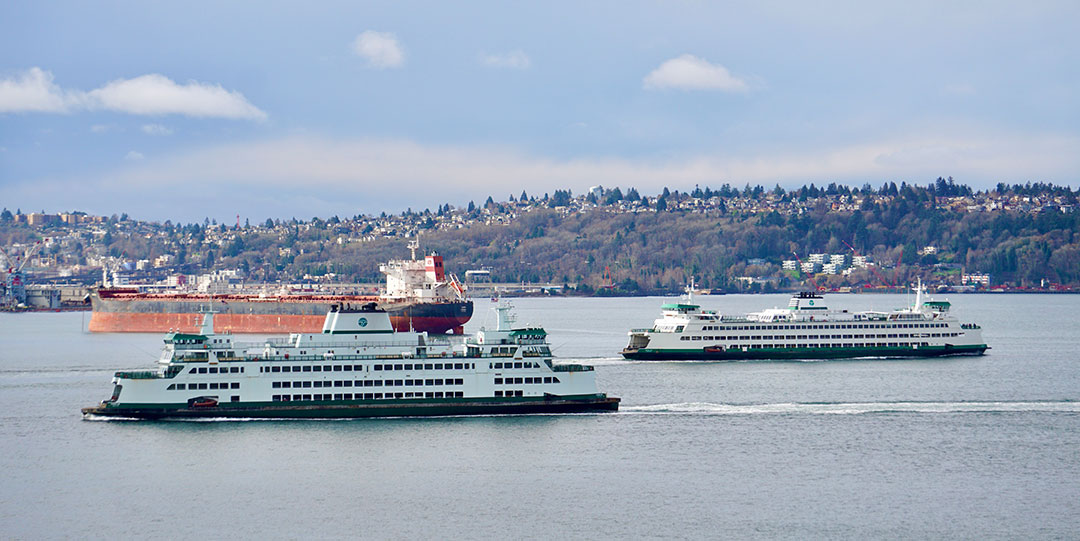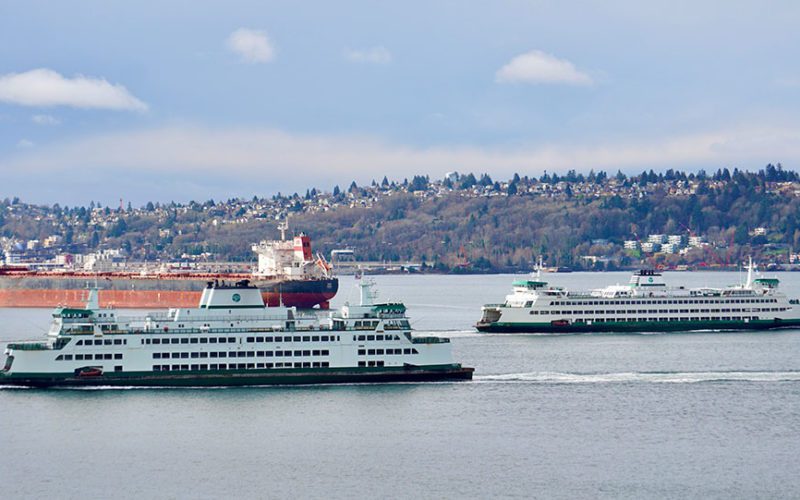
Washington State Ferries (WSF) will seek new bidders for its hybrid-electric ferry project after failing to reach agreement with Vigor, one of its longtime shipbuilding partners in the Seattle area.
The two sides confirmed separately that they could not come to terms on key aspects of a proposed contract for final design work and construction of five battery-electric/diesel hybrid vehicle ferries.
The process of seeking new bids for the $1 billion project will delay the start of construction on the new ferry class, according to Matt von Ruden, system electrification program administrator for the Washington Department of Transportation, Ferries Division. The lead ferry in the series, he said, won’t be delivered until 2027 at the earliest.
“The tough part for Ferries is that it will take time to issue a new (request for proposals) and award a contract and pick up where we left off,” he said in a recent interview, using a shorthand name for the state’s Ferries Division.
The WSF electrification effort is one of the commercial vessel electrification projects happening now in the United States. The estimated $1.33 billion undertaking involves construction of five new hybrid-electric Olympic-class ferries and the conversion of WSF’s three largest ferries, the Jumbo Mark II class, from diesel to hybrid electric propulsion.
The state is finalizing bid documents for the conversion work, which will feature a Siemens hybrid platform, and hopes to issue a contract later this year, according to von Ruden. WSF officials expect construction work on the first conversion to begin next year.
The electrification program has many objectives, and they include reducing emissions and cutting fuel costs. The three Jumbo Mark II ferries, Wenatchee, Tacoma and Puyallup, together burn more than a quarter of all diesel fuel consumed each year across the WSF fleet, according to ferry officials.
The Washington Legislature initially authorized funding for a single new hybrid electric Olympic-class ferry. However, subsequent appropriations allocated $1 billion toward the construction of five of the vessels, each of which will be capable of transporting 1,500 passengers and up to 144 vehicles.
WSF issued a contract to Vigor in December 2019 worth $9 million for functional design and engineering for the new hybrid ferry class. The award functioned as a change order tied to the delivery of four conventionally driven Olympic-class ferries between 2012 and 2018.
Vigor spokeswoman Jill Mackie said that design work is “substantially” completed. WSF will own the design featuring ABB hybrid architecture once Vigor delivers it by the end of the year.
Negotiations between the two sides on detailed engineering work and construction of the new ferries broke down in May, according to an internal memo written by Patty Rubstello assistant secretary of the WSDOT/Ferries Division.
“Unfortunately, we cannot reach agreement with Vigor on either price or contract terms, including the appropriate assignment of risk,” she said in the memo, which WSF shared with Professional Mariner.
“Vigor’s proposed terms of the contract differ significantly from those proposed by WSDOT, as does their cost estimate. We notified Vigor today that we are ceasing negotiations and intend to solicit competitive bids to deliver these vessels,” she continued.
Neither side would divulge the sticking points in the proposed contract, although von Ruden cited as an example a scenario where the vessel did not meet performance requirements. In such a scenario, under terms sought by WSF, the state might not accept the vessel.
“That is an example of something that the shipyard wasn’t necessarily comfortable with,” he said. “There were other terms and conditions related to risk and liabilities.”
Mackie, the Vigor spokeswoman, said contracts for vessels of this size and scale are highly complex. “There were multiple areas of ongoing discussion, and in the end, we simply couldn’t reach agreement on all the terms,” she said by email. “We very much appreciate our long-standing partnership with Washington State Ferries and look forward to continuing to work together.”
WSF officials are starting the process to seek bidders for the five-boat hybrid electric Olympic-class ferries contract. The state has released a Request for Information from potential shipyard partners. The agency hopes to issue the formal request for proposals in October. Based on that time frame, a contract likely would be awarded in late 2023 or early 2024.
State law stipulates that the contract must be awarded to a Washington shipyard, although it includes language that allows WSF to seek out-of-state bids if the in-state bids are more than five percent greater than the engineer’s estimate. “By resoliciting in a competitive environment,” von Ruden said, “our intent is to get the best price for the people of Washington that we can.”
WSF is one of the largest ferry operators in the U.S. It operates 22 vessels across 10 routes. In 2019, the last year before the Covid-19 pandemic, the system transported almost 24 million riders.

